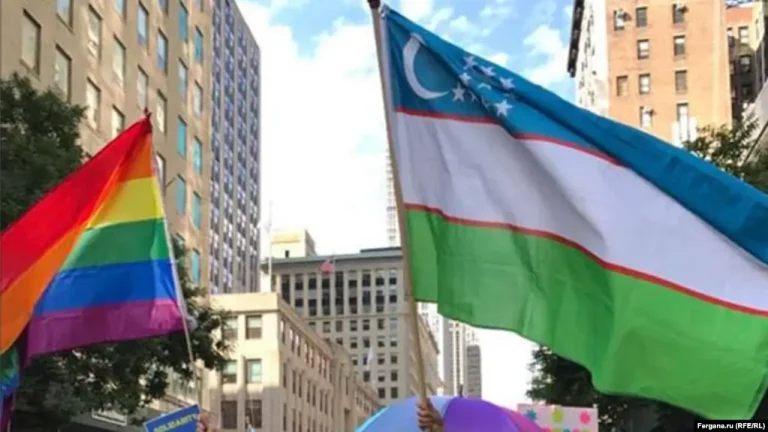
Uzbekistan: LGBT Community In Uzbekistan Faces Abuse, Discrimination, Imprisonment, Report Says
The report (prepared by IPHR, ECOM, AHRCA) “Like Living On A Different Planet: Gays, Bisexual Men, And Trans People Vulnerable To Abuse, Imprisonment, And Discrimination In Uzbekistan” comes as Uzbekistan’s new draft Criminal Code is being considered.
The report says that in 2021 at least 36 LGBT people were convicted under Article 120 of the Uzbek Criminal Code, which criminalizes homosexuality. Twenty-five of those convicted were sentenced to prison terms.
And many more Uzbeks live under the looming threat of Article 120 in their daily lives, the rights groups said.
Describing the situation of LGBT people in Uzbekistan, one gay man said: “It’s as if we lived on a different planet, where it is normal to hate, imprison, discriminate, and kill people simply for who they are.”
The report didn’t disclose the man’s name to protect his safety.
Some police officers exploit the criminalization of homosexuality and the societal shame associated with it in a conservative society to extort money from gay and bisexual men, the report said, citing accounts by many who had been victimized.
No Confidentiality At HIV Centers
The report says that police in Uzbekistan often have access to the confidential information of LGBT people who are registered at HIV treatment centers and they use this information to blackmail, threaten, or persecute them.
“We have documented cases where HIV center staff have informed the police of a man’s sexual orientation, putting him at risk of persecution. This is a violation of the right to privacy and poses a major obstacle to accessing much-needed health care,” said Yuri Yourski of ECOM.
Akmal, a 24-year-old gay man, tested positive for HIV at a medical facility in eastern Uzbekistan in early 2022.
Akmal said he fell into a depression and turned down all invitations from the local HIV center for treatment. Several months later, Akmal got a phone call from the police who urged him to go to the center.
When Akmal went to the clinic, the staff questioned him about his sexual orientation, his sex life, and took his mobile phone to take down information about his contacts.
In another case, a gay man identified as Rasul was questioned by a doctor about his sexual orientation when he tested positive for HIV. Fearing for his safety, Rasul lied that he was heterosexual.
But the medic pressed further, questioning why he was unmarried, asserting that in Uzbekistan HIV is only spread by homosexuals of a certain age, and claiming on that basis that Rasul must be a homosexual.
This dispute culminated in the doctor threatening to disclose Rasul’s diagnosis to his family and put him on record as a homosexual, the report said.
The rights groups have also documented cases that some “aggressive homophobes” in Uzbekistan frequently seek out LGBT people, threaten them with violence, and disseminate their names, contact details, and photos online with calls to kill them.
The “homophobes” also target people who call for tolerance toward the LGBT community on social media.
The report accuses Uzbek authorities of severely curtailing the right to freedom of expression when it comes to expressions of support for LGBT people and the dissemination of information about human rights violations affecting them.
The report says Uzbek officials have sought to justify the criminalization of same-sex relations with references to religion, culture, tradition, and public opinion. They claimed that decriminalization would have negative implications for society and for Uzbekistan’s reputation in the Muslim world.
But they have failed to address the fact that depriving people of their liberty because of their sexual orientation contradicts Uzbekistan’s obligations under international human rights law, the report said.
This link is provided for convenience and informational purposes only; it does not constitute endorsement or approval by the Judges’ Forum.





